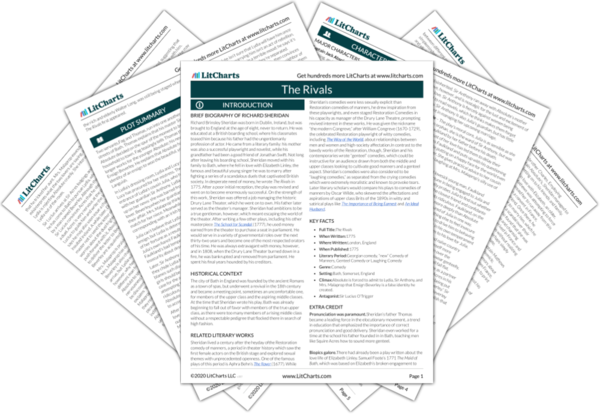Summary
Analysis
Sir Lucius is strolling on the North Parade, hoping to run into Absolute and challenge him to a duel. He remarks to himself that officers are always getting in the way of his love affairs. He sees Absolute, who is talking to himself angrily, complaining that Lydia’s romantic inclinations have gone to such extreme lengths that all his plans have come to naught. Seeing that Absolute is in a bad mood, Sir Lucius reflects that it would be a good time to get Absolute to quarrel with him.
The rationale behind Sir Lucius’s desire to duel Absolute is never made clear. It is possible that he wants to duel him because of some insult to Ireland that occurred outside the action of the play, or that he has realized Absolute is courting Lydia and wants to challenge him for this reason. Additionally, Sir Lucius’s eagerness to quarrel with Absolute when he is in a bad mood would have been considered poor form to those who knew the customs surrounding dueling.
Themes
Sir Lucius approaches Absolute and says he begs to differ with him. When Absolute asks what about, Sir Lucius says it doesn’t matter. Absolute says it appears Sir Lucius means to quarrel with him, to which Sir Lucius assents, but also continues to refuse to explain what the quarrel is about, saying only that Absolute ought to remember an affront he gave to Sir Lucius. Absolute gives up trying to understand the cause of the duel and agrees to meet Sir Lucius at King’s-Mead-Fields at six o’clock, which is the same time Acres has set for his duel with Beverley. Sir Lucius says it will be too dark to fight with guns, but it will be perfect lighting for swords, and leaves.
Regardless of Sir Lucius’s motivations, he fails to provide a concrete reason for calling a duel. This is not proper etiquette for dueling, but is indicative of Sir Lucius’s extreme eagerness to duel, which the play parodies. The offhanded way that he refers to the choice of weapons for the duel also shows that Sir Lucius has an inappropriately casual approach to dueling. Absolute, on the other hand, acts as befits a gentleman. Once he realizes that he cannot get a reason out of Sir Lucius, he accepts the challenge, because Sir Lucius is his social equal, and to refuse the challenge would be to sacrifice his honor.
Themes
Absolute next runs into Faulkland and bemoans his current situation, saying if he did not know that he might soon be killed, he could scarcely gather the strength to explain what had happened. Faulkland questions Absolute, and Absolute explains that Lydia has rejected him now that she knows his true identity and Sir Lucius has challenged him to a duel for no apparent reason. He says he needs Faulkland to accompany him as his second.
The ever-confident Absolute is at a low point, finding himself in two situations that he cannot charm his way out of: a duel and a rejection by Lydia. He asks Faulkland to come to the duel and serve to assist and advise him as a second, as was required of combatants by the generally accepted etiquette of dueling.
Themes
Faulkland says he wishes the duel were at some other time, because he has treated Julia cruelly and will not feel like himself until they have reconciled. A servant then delivers a letter to Faulkland from Julia. Faulkland fears she will break off their engagement and is scared to look at the letter, so Absolute reads it. Julia writes that she is sure that Faulkland already feels terrible for how badly he treated her and so she will not rebuke him further, but that she wishes to speak to him soon. She signs it “yours ever and truly.” Absolute notices that Faulkland does not seem happier upon hearing that he is forgiven. Faulkland says that he thinks it is inappropriate for a woman to forgive without being asked for her forgiveness, just like women should not show that they love a man unless he makes the first move. Absolute responds that Faulkland is incorrigible and is the source of all his own anxiety, and therefore deserves ridicule, not sympathy. He leaves, and Faulkland reflects that Absolute’s duel has given him an idea for a way to test the purity of Julia’s love.
Once again, Faulkland has found something in Julia’s behavior to misinterpret. Whereas earlier in the play he was put off by her less sentimental approach to love and ability to carry on in life without him, he now accuses her of being unladylike because she has forgiven him without being asked. To Absolute, who is attracted to the rebellious Lydia, Faulkland’s complaint is a ridiculous one, and even to those in the 18th century audience, who may have seen Julia’s letter as an unusually bold one to be written by a proper, unmarried girl, it is clear that Julia must take extreme measures to deal with Faulkland’s moods and caprices.
Themes
Get the entire The Rivals LitChart as a printable PDF.













